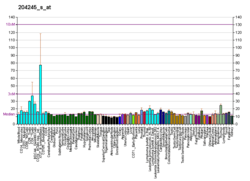RPP14
Ribonuclease P protein subunit p14 is an enzyme that in humans is encoded by the RPP14 gene.[5][6][7]
References
- 1 2 3 GRCh38: Ensembl release 89: ENSG00000163684 - Ensembl, May 2017
- 1 2 3 GRCm38: Ensembl release 89: ENSMUSG00000023156 - Ensembl, May 2017
- ↑ "Human PubMed Reference:".
- ↑ "Mouse PubMed Reference:".
- ↑ Jarrous N, Eder PS, Wesolowski D, Altman S (Mar 1999). "Rpp14 and Rpp29, two protein subunits of human ribonuclease P". RNA. 5 (2): 153–157. PMC 1369747
 . PMID 10024167. doi:10.1017/S135583829800185X.
. PMID 10024167. doi:10.1017/S135583829800185X. - ↑ Jiang T, Altman S (Apr 2002). "A protein subunit of human RNase P, Rpp14, and its interacting partner, OIP2, have 3'-->5' exoribonuclease activity". Proc Natl Acad Sci U S A. 99 (8): 5295–5300. PMC 122763
 . PMID 11929972. doi:10.1073/pnas.072083699.
. PMID 11929972. doi:10.1073/pnas.072083699. - ↑ "Entrez Gene: RPP14 ribonuclease P 14kDa subunit".
Further reading
- Jiang T, Altman S (2001). "Protein-protein interactions with subunits of human nuclear RNase P". Proc. Natl. Acad. Sci. U.S.A. 98 (3): 920–925. PMC 14685
 . PMID 11158571. doi:10.1073/pnas.021561498.
. PMID 11158571. doi:10.1073/pnas.021561498. - Venter JC, Adams MD, Myers EW, et al. (2001). "The sequence of the human genome". Science. 291 (5507): 1304–1351. PMID 11181995. doi:10.1126/science.1058040.
- Jiang T, Guerrier-Takada C, Altman S (2001). "Protein-RNA interactions in the subunits of human nuclear RNase P". RNA. 7 (7): 937–941. PMC 1370153
 . PMID 11455963. doi:10.1017/S1355838201010299.
. PMID 11455963. doi:10.1017/S1355838201010299. - Strausberg RL, Feingold EA, Grouse LH, et al. (2003). "Generation and initial analysis of more than 15,000 full-length human and mouse cDNA sequences". Proc. Natl. Acad. Sci. U.S.A. 99 (26): 16899–16903. PMC 139241
 . PMID 12477932. doi:10.1073/pnas.242603899.
. PMID 12477932. doi:10.1073/pnas.242603899. - Ota T, Suzuki Y, Nishikawa T, et al. (2004). "Complete sequencing and characterization of 21,243 full-length human cDNAs". Nat. Genet. 36 (1): 40–45. PMID 14702039. doi:10.1038/ng1285.
- Welting TJ, van Venrooij WJ, Pruijn GJ (2004). "Mutual interactions between subunits of the human RNase MRP ribonucleoprotein complex". Nucleic Acids Res. 32 (7): 2138–2146. PMC 407822
 . PMID 15096576. doi:10.1093/nar/gkh539.
. PMID 15096576. doi:10.1093/nar/gkh539. - Brandenberger R, Wei H, Zhang S, et al. (2005). "Transcriptome characterization elucidates signaling networks that control human ES cell growth and differentiation". Nat. Biotechnol. 22 (6): 707–716. PMID 15146197. doi:10.1038/nbt971.
- Suzuki Y, Yamashita R, Shirota M, et al. (2004). "Sequence comparison of human and mouse genes reveals a homologous block structure in the promoter regions". Genome Res. 14 (9): 1711–1718. PMC 515316
 . PMID 15342556. doi:10.1101/gr.2435604.
. PMID 15342556. doi:10.1101/gr.2435604. - Gerhard DS, Wagner L, Feingold EA, et al. (2004). "The status, quality, and expansion of the NIH full-length cDNA project: the Mammalian Gene Collection (MGC)". Genome Res. 14 (10B): 2121–2127. PMC 528928
 . PMID 15489334. doi:10.1101/gr.2596504.
. PMID 15489334. doi:10.1101/gr.2596504. - Andersen JS, Lam YW, Leung AK, et al. (2005). "Nucleolar proteome dynamics". Nature. 433 (7021): 77–83. PMID 15635413. doi:10.1038/nature03207.
- Rual JF, Venkatesan K, Hao T, et al. (2005). "Towards a proteome-scale map of the human protein-protein interaction network". Nature. 437 (7062): 1173–1178. PMID 16189514. doi:10.1038/nature04209.
- Kimura K, Wakamatsu A, Suzuki Y, et al. (2006). "Diversification of transcriptional modulation: large-scale identification and characterization of putative alternative promoters of human genes". Genome Res. 16 (1): 55–65. PMC 1356129
 . PMID 16344560. doi:10.1101/gr.4039406.
. PMID 16344560. doi:10.1101/gr.4039406.
This article is issued from
Wikipedia.
The text is licensed under Creative Commons - Attribution - Sharealike.
Additional terms may apply for the media files.




